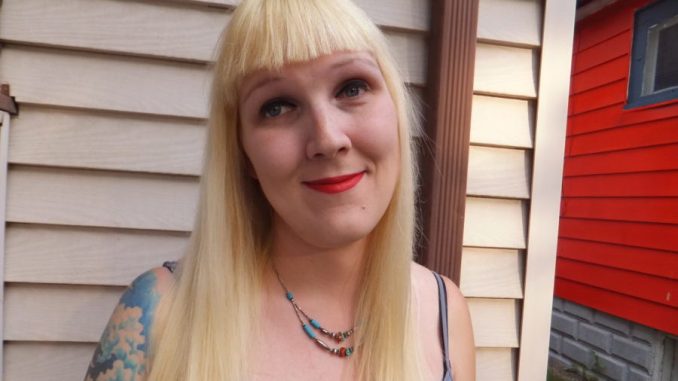
Casey Plett is the author of the novel Little Fish, the short story collection A Safe Girl to Love and co-editor of the anthology Meanwhile, Elsewhere: Science Fiction and Fantasy from Transgender Writers. She wrote a column on transitioning for McSweeney’s Internet Tendency and her essays and reviews have appeared in The New York Times, Maclean’s, The Walrus, Plenitude, The Winnipeg Free Press, and other publications. She is the winner of a Lambda Literary Award for Best Transgender Fiction and received an Honour of Distinction from The Writers’ Trust of Canada’s Dayne Ogilvie Prize for LGBTQ Emerging Writers. She lives in Windsor, Ontario.
Erin’s note: We’re excited about the launch of Casey Plett’s newest book, Little Fish, this Wednesday April 25th, 7 pm at McNally Robinson Grant Park, Winnipeg, alongside Amber Dawn and Joshua Whitehead. Details here.
1) When did you first discover your passion for writing?
I was eight? I was typing on my best friend’s computer in a basement in Morden and thought “Books. I could write one of those! Using this computer!” I could not, obviously! but I send a huge amount of love back to eight-year-old Casey for planting that seed.
2) Who are your writing influences?
There are so many of them, but for the sake of simplicity and this site I’ll name my big Mennonite writer influences, which would be all of Miriam Toews’ work and Sandra Birdsell’s early stories. Their writing is incredibly emotional and evocative in the way I always wanted to write, but they also bring across an enormous “felt sense” of their worlds and communities, like a soundless wind. I’m of the next generation and I didn’t spend my whole life in Mennonite communities the way they did, but they inspired how I wanted to write a world. And, it always has to be said, no one can be funny in a heavy story like Miriam.
3) How significant is your Mennonite background to your writing?
A lot. In my first book, A Safe Girl to Love, which is a book of short stories, only two of the stories have any explicitly Mennonite-related content (“Other Women” and “Not Bleak”), but it’s been pointed out to me that they are two of the longest stories and are in some ways anchors for the book. Identity politics or whatever in writing tends to mean you get pigeonholed as one thing or the other, and I’ve also made the choice to happily accept the label of “trans writer” so I think that’s pretty much how I’m looked at.
Having that said, the new book I just wrote, Little Fish, centers around Mennonite stuff a little more. Wendy, the protagonist, has had a complicated relationship with Mennonitism even before she came out (she was raised religiously by her grandparents then left the church as a teenager), and her interactions with other Mennonites can sort of go in three categories.
a) The boorish decadent non-believers, represented by her apostate dad and her friend Sophie, who is also trans and didn’t grow up in the church.
b) The assimilated conservatives, represented somewhat amorphously by her late grandmother and her aunts and uncles, who are out in the country and make lots of money and have an issue with her being trans. They would have commonalities with US white evangelicism.
c) An older generation, represented by her late grandfather and a mysterious woman named Anna, gentle and kind people who try to keep a lot of their old ways throughout their life, to varying degrees of success.
The book takes place when she’s thirty. Wendy thinks she no longer believes, and that her culture hates her and so why would she have time for any of it. But the universe has some hard and strange stuff in store for her.
4) What do you wish more Mennonites understood about trans people?
That we exist? Hahaha. I guess one thing that sticks in my craw is the idea that Scripture and being trans are incompatible. (This sticks in my craw with both secular and practicing Mennonites, btw!) Matthew 19:12 is salient among others. Obviously there are plenty of Mennonites who don’t wish to think much about trans people beyond the idea that we’re sinful or we promote the idea that God makes mistakes or we’re against biology or something, but I haven’t found much success engaging with those lines of thinking. I attend Windsor Mennonite Fellowship, and they are an affirming church, but I’m lucky to have that space. Here’s a thought: Trans people are not as worldly as anything else, and in fact, I find commonalities in my trans and Mennonite identity in our unworldliness. Being trans, for me, has meant being a shadow apart of larger society, and that is a space Mennonites have culture and language for inhabiting. Daniel Shank Cruz has made this point more largely and intelligently regarding the commonalities of queerness and Mennonites in general. So maybe that’s what I wish more Mennonites knew.
5) Now that you live in Southern Ontario, is there anything you miss about Manitoba?
The sunlight. The sunsets. The air. The people. The land. My family, my friends. Everything.

